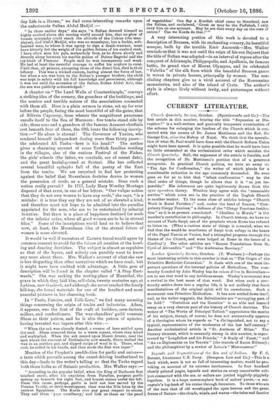London Quarterly Review, October. (T. Woolmer.) —Perhaps the most interesting
article in this number is that on "The Origin o! the Primitive Methodist Connexion." It deals with one of the most im- portant questions of the internal politics of Methodism. The com- munity founded by John Wesley has its raison d'etre in Revivalism— not to use that word in any invidious sense. Wesley's movement was a revival in the best sense of that word. But when such a com- munity settles down into a regular life, it is not unlikely that fresh manifestations of the original spirit will be unwelcome. Such a movement was Primitive Methodism. It has now settled down itself, and, as the writer suggests, the Salvationists are "occupying part of its field." "Cerinthus and the Gnostics" is an able and learned essay on a very obscure part of the history of Church doctrine. The writer of "The Works of Principal Tulloch" appreciates the merits of his subject, though, of course, he does not unreservedly approve of a theologian whom he regards as "a distinguished, not to say a typical, representative of the moderates of the last half-century." Another ecclesiastical article is "St. Ambrose of Milan." The literary element, which is unusually strong in this number, is repre- sented by "Longfellow and his Friends," "A Study of Faust," and "An ex-Diplomatist on his Travels" (the travels of Baron Balmer); and the philosophical by a review of Letze's "Microcosmos."


































 Previous page
Previous page